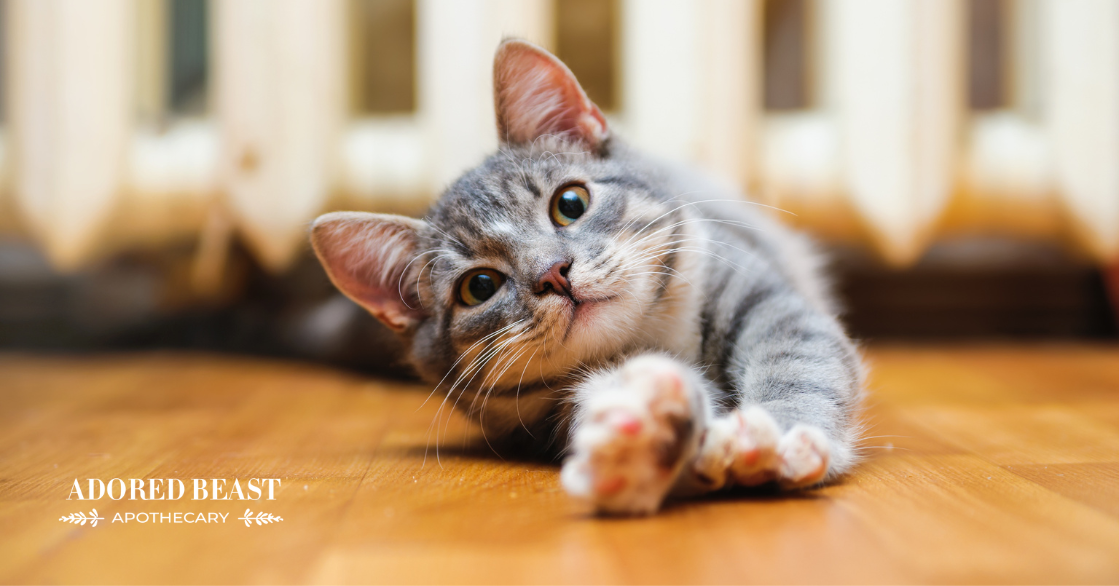A soft, shiny coat and clear, healthy skin don’t just make your cat look good; they’re also key indicators of your cat’s overall health. Just like in humans, skin is the largest organ in a cat’s body. It plays a vital role in protection, regulating temperature, and supporting the immune system.
If your cat is dealing with dry, itchy, flaky, or inflamed skin, natural supplements can offer gentle, effective support from the inside out. Today, let’s explore the best natural skin supplements for cats, why they work, and how they can help your feline friend look and feel their best.
Top Natural Skin Supplements for Cats
Here are our top picks when it comes to the best skin supplements for cats.
1. Omega-3 Fatty Acids
Why they’re beneficial: Omega-3s are powerful anti-inflammatories that help soothe itchy or irritated skin, reduce reactions to allergens, and support a soft, hydrated coat. They help maintain the skin’s barrier, which protects against dryness and environmental irritants.
Bonus: Omega-3s also support joint, heart, kidney, and brain health – great for cats of all ages.
Tip: Look for purified, sustainably sourced omega-3 oils specifically formulated for cats. These should be free from heavy metals and other contaminants. Start with small amounts and mix into food for easier acceptance. Our Potent-Sea Omega-3 is a sustainably sourced option, made from microalgae. It has very high levels of EPA and DHA and it doesn’t harm the oceans!
2. Probiotics
Why they’re beneficial: A healthy gut can lead to healthier skin. Probiotics help regulate immune responses, reduce inflammation, and improve nutrient absorption—essential for skin repair and hydration, especially in cats with allergies or sensitivities.
Tip: Use feline-specific probiotic blends containing strains that are proven to survive in the feline digestive tract. Our go-to pick is Felix’s Flora, made with feline-specific strains, coupled with prebiotics and beneficial fulvic and humic acid!
3. Coconut Oil
Why it’s beneficial: Coconut oil contains medium-chain fatty acids like lauric acid, which can help fight bacteria, yeast, and inflammation. It supports the skin barrier and can reduce dryness and flakiness.
- Internal Use: MCT oil (a concentrated form of coconut oil) can be easier for cats to digest and may provide anti-inflammatory benefits.
- Topical Use: If your cat tolerates it, a small amount of coconut oil can be gently massaged into dry or irritated spots.
Tip: Start with a tiny amount—about ⅛ teaspoon—and mix into food or apply externally. Monitor for signs of loose stool or sensitivity.
4. Spirulina
Why it’s beneficial: Spirulina is a nutrient-dense blue-green algae rich in protein, antioxidants, and essential fatty acids. It can help detoxify the body, reduce inflammation, and support a vibrant, healthy coat.
Tip: Use only trusted, organic brands. Start with a tiny pinch (about 1/16 tsp) daily. Too much too soon may cause digestive upset.
5. Chamomile Tea
Why it’s beneficial: Chamomile is known for its calming and anti-inflammatory properties. When brewed into a tea and cooled, it can be used topically to soothe itchy or irritated skin. Chamomile tea can be gently dabbed onto irritated skin or hotspots using a soft cloth or cotton pad. It may help reduce redness, itching, and inflammation.
Tip: Always use organic, caffeine-free chamomile tea. Let it cool completely before applying. Avoid chamomile if your cat has allergies to plants in the daisy family.
[RELATED] Best Skin Supplements for Dogs
Honourable Mention #1: Let Your Cat Be a Cat
While you probably don’t want your indoor cat rolling in dirt, giving them access to safe, natural spaces—like balconies with cat grass or pet-safe potted plants—can enrich their environment and support their natural microbiome.
Exposure to natural bacteria (not overly sterile conditions) can help maintain skin health. If your cat able to roam safely in your backyard, let them feed their natural instincts. If not, take them on a leash to explore pet-friendly parks or gardens for a little supervised dirt-digging or grass-rolling fun.
Honourable Mention #2: Skip the Bath (Mostly)
Cats are excellent self-groomers. Unless your vet specifically recommends it, frequent bathing is unnecessary and may strip natural oils from their skin, leading to dryness and irritation.
Tip: Instead of baths, use a soft, damp cloth or pet-safe grooming wipes to clean dirt or allergens off their coat. Regular brushing also helps distribute oils, remove dead hair, and reduce skin flakes.
When introducing any new supplement, always start small and watch how your cat responds. Natural doesn’t always mean risk-free—especially for sensitive systems like those of our feline friends. Choose high-quality, species-appropriate products, and consult your holistic or integrative vet if you’re unsure.
With the right skin supplements for cats, a balanced diet, gentle grooming, and lots of love, your cat’s coat can shine—reflecting vibrant health from the inside out.












